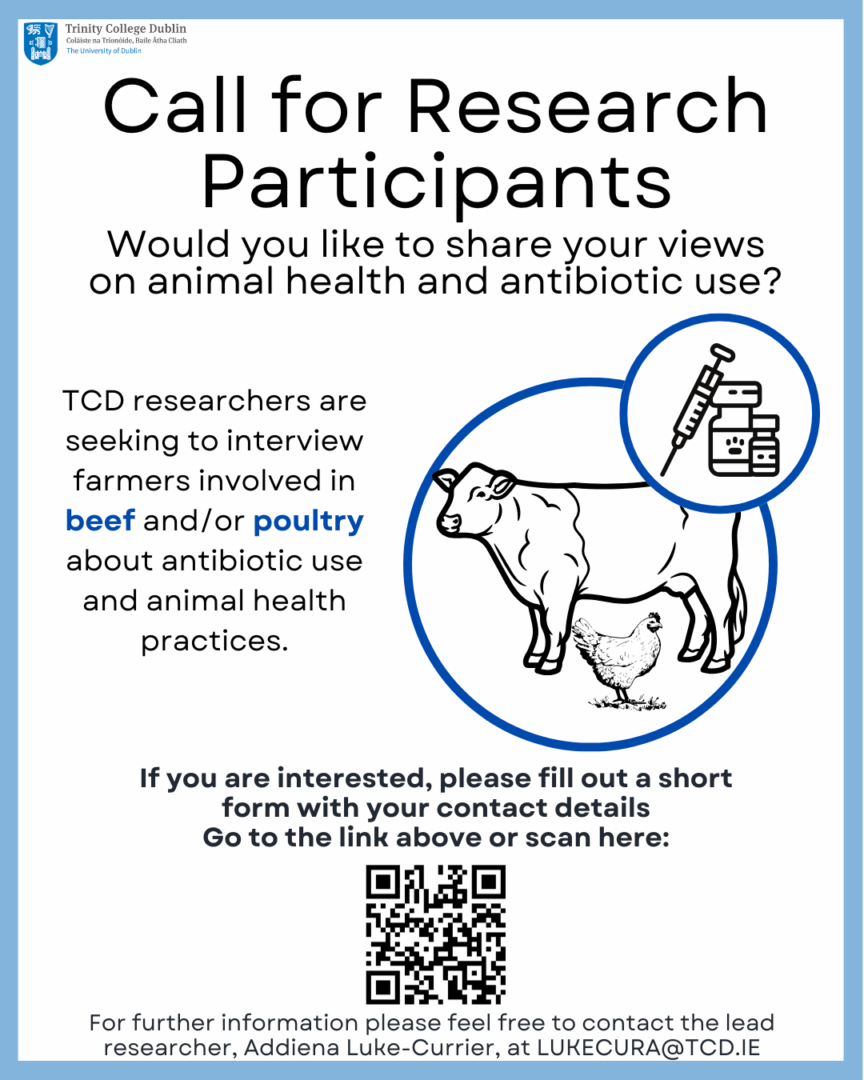What is the challenge: Antimicrobial Resistance
Antimicrobial Resistance (AMR) is growing global threat to human, animal, and plant health, as well as to food security and the livelihoods of the agricultural community. AMR is the ability of microorganisms which can cause disease, such as bacteria, fungi, protozoa, and viruses, to resist antimicrobial treatments (such as antibiotics). This means that treatments are less effective and may no longer work, increasing the risk for severe illnesses, disease spread, and death in both animals and humans. It is unlikely any new antimicrobials will be developed and made available in the near future and it is predicted that by 2050, ten million people could die each year due to AMR. To address this issue, there are a number of best practices farmers can engage in. Additionally, restrictions on antimicrobial use have also been implemented at the Irish and European levels that will have a direct effect on the farming community.
What can farmers do?
We can slow the threat of AMR by keeping animals healthy and by engaging in prudent antimicrobial use. Improving animal health reduces the need for the use of antimicrobials and can help to maximise productivity. This can be done by engaging in and strengthening activities which are already common practice on many farms, such as developing herd health plans, ensuring good biosecurity and animal husbandry practices, and more.
Prudent antimicrobial use involves only using antimicrobials following veterinary advice and always using antimicrobials as prescribed. The 6 Rights of Antimicrobial Use can help to guide prudent use:
- Right Veterinary Diagnosis Correct diagnosis by a vet can determine if the problem is caused by bacteria. Antibiotics should only be used to treat bacterial infections.
- Right Animal(s) Only animals with clinical symptoms should be treated.
- Right Antibiotic The correct antibiotic, as prescribed by the vet, should be used. This can be informed by testing and helps to ensure that the antibiotic chosen is effective against the bacteria present.
- Right Dose The correct amount should be given according to the product instructions and based on an accurate estimate of animal weight.
- Right Duration You should always complete the recommended course of antibiotics, even if the animal appears to get better.
- Right Storage and Disposal Disposing of out-of-date medicines in clinical waste containers helps to prevent resistant bacteria from developing in the environment.
Many resources are available to support farmers in the effort to reduce antimicrobial use and resistance and can be found below.
What impact would this have on Ireland and our farms?
Addressing AMR by engaging in prudent use of antimicrobials can help to ensure that we have effective antimicrobials to use in the future for our animals and for ourselves. It can help to prevent devastating effects such as more severe disease or death of animals and costs for farmers in terms of losses, labour costs, veterinary bills, and expensive antimicrobials. Further, we can protect a sustainable future for farming in Ireland and maintain our world-renowned agricultural reputation.
What is the impact of new antimicrobial use regulations on farmers?
Recent legislation at the Irish and European levels aims to address AMR and requires farmers to make certain changes to their antimicrobial use. Researchers from TCD’s RESIST AMR team would like to speak to farmers to understand how these policies impact them and what supports or challenges they perceive to affect their efforts to make the necessary changes. Additionally, as this problem is growing, we can expect future regulations to further restrict antibiotic use. These policies and practice options should be informed by farmers experiences to ensure that they are practical and can be successfully implemented at the farm-level.
Calling all farmers and professionals!
If you are interested in sharing your views on this topic, please visit this link to provide your contact details. All participant’s identities will remain anonymous in any research outputs. You can contact the lead researcher for the study, Addiena Luke-Currier, at lukecura@tcd.ie or 089 268 3087 for more details.
References and Further Resources:
AMR:
What is it? Antimicrobial Resistance Food and Agriculture Organization of the United Nations
What is AMR – Teagasc | Agriculture and Food Development Authority
WHO – Antimicrobial Resistance Fact Sheet
Responsible Use of Antimicrobials:
Code of Good Practice Regarding the Responsible Prescribing and Use of Antibiotics in Farm Animals
National AMR Plans and Reports:
Ireland’s Second One Health National Action Plan on Antimicrobial Resistance 2021-2025 (iNAP2)




